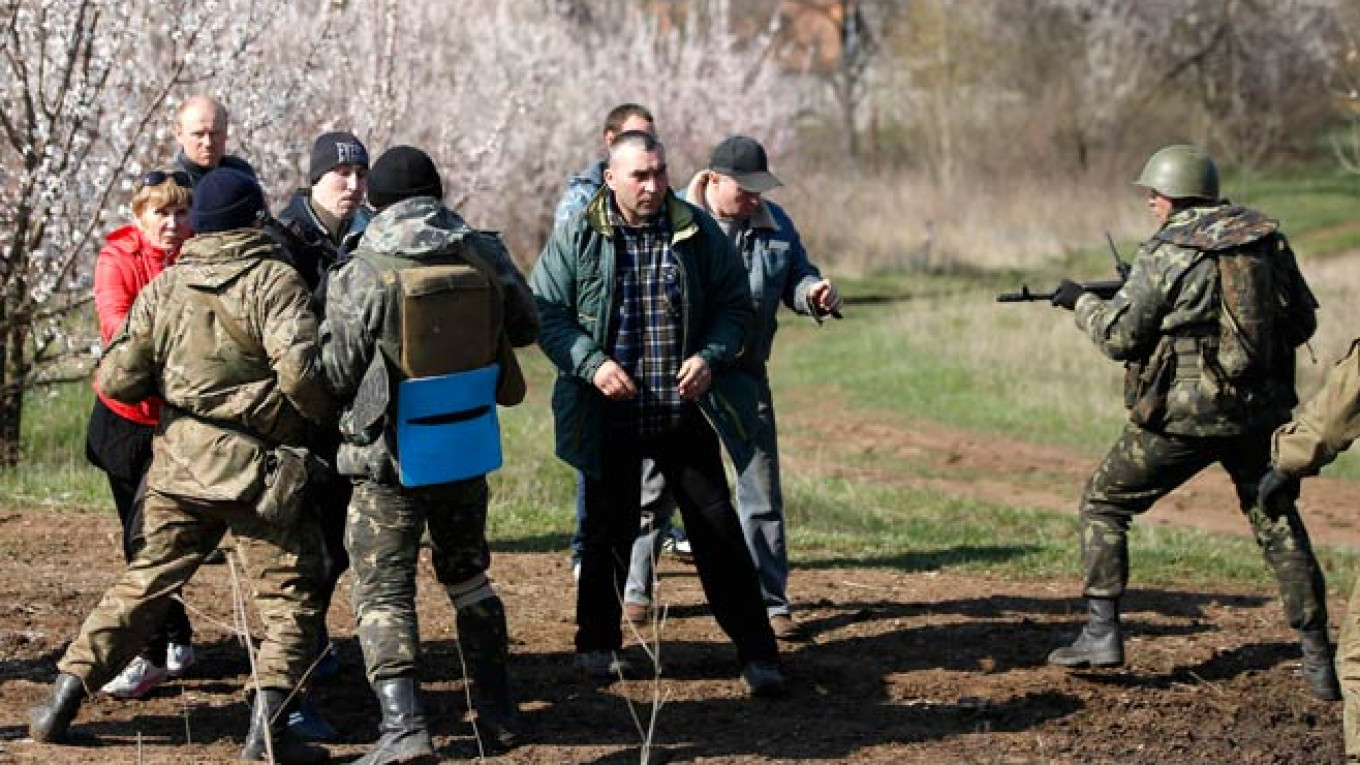SLOVYANSK, Ukraine — The eastern Ukrainian city of Slovyansk appeared calmer than some media reports suggested on Wednesday after Ukrainian authorities launched an anti-terrorism operation to tackle pro-Russian protests, but journalists were routinely harassed and separatists maintained a strong grip on the city.
The new government in Kiev sent paratroopers to the area around the city to deal with armed pro-Russian protesters who had seized administrative buildings in Slovyansk and nearby Kramatorsk. Ukrainian authorities have said the protesters were working for Russian special forces, though Russia has denied this claim.
On Wednesday, there were reports of a column of armored vehicles flying Russian flags in the city, though this reporter did not witness the scene.
According to The Associated Press, one of the men atop an armored vehicle said the men were Ukrainian servicemen who had defected to the pro-Russian side, though other media reports suggested the men may not have defected voluntarily. (See related story, Page 2)
Earlier media reports suggested that police in the city had sided with the protesters, but several police officers told The Moscow Times they remained "politically neutral."
Since Saturday, pro-Russian protesters have taken over strategic points in the city, including the police headquarters, City Hall and the security service building, erecting barricades around all of them.
The main protest camp, with a crowd of demonstrators and several tents, was set up near the police headquarters, which were guarded by activists holding riot police shields. The barricade near the building was made of tires and decorated with Russian Orthodox icons, as well as a flag of the People's Republic of Donetsk — an entity the separatist protesters hope to establish.
Roads leading to the city were also heavily barricaded, and protesters refused to let many people leave or enter.
On Tuesday, Slovyansk was accessible by train, but by Wednesday the railroads were also blocked.
Hindered transportation was not the only grievance expressed by locals, however.
Svetlana, a 43-year-old businesswoman, said that people were afraid of the unrest and many had to stay at home. Many cafes, schools and kindergartens have been closed throughout the city, she said, and several stores looted by marauders.
There have also been sightings of snipers on some roofs, she said.
"The protesters say they are protecting us but who are they protecting us from? There are no banderites here," she said, referring to supporters of Stepan Bandera, a nationalist leader popular in western Ukraine.
"This is an epidemic of madness. A cheap show," she said.
The city had been absolutely apolitical before the recent unrest began, she said, adding that this abrupt turn toward politics was proof that the movement was not spontaneous and was being organized by local tycoons and the Kremlin.
"The whole point of federalization is that tycoons like Rinat Akhmetov and Igor Kolomoisky want to keep being local tsars," she said.
Federalization or Joining Russia?
Among the supporters of the pro-Russian movement, support was split between federalization or an independent Donetsk republic and the idea of joining Russia.
For some, support for the protest movement in Slovyansk was connected with social status.
"Those who have managed to open a business do not want to join Russia, but ordinary people do," said Yury, a middle-aged taxi driver who declined to give his last name.
Many people interviewed spoke on condition of anonymity, citing fear of reprisals amid growing tensions in the area.
"It does not matter what country we live in, we just want to be autonomous," said Viktor, a 45-year-old taxi driver who also refused to provide his last name.
Some protesters drew parallels between the uprising in Kiev that resulted in former President Viktor Yanukovych's ouster and the pro-Russian protests.
"So people on Maidan can seize administrative buildings, and we cannot?" said Oleg, 30, a security guard.
Contact the author at [email protected]
A Message from The Moscow Times:
Dear readers,
We are facing unprecedented challenges. Russia's Prosecutor General's Office has designated The Moscow Times as an "undesirable" organization, criminalizing our work and putting our staff at risk of prosecution. This follows our earlier unjust labeling as a "foreign agent."
These actions are direct attempts to silence independent journalism in Russia. The authorities claim our work "discredits the decisions of the Russian leadership." We see things differently: we strive to provide accurate, unbiased reporting on Russia.
We, the journalists of The Moscow Times, refuse to be silenced. But to continue our work, we need your help.
Your support, no matter how small, makes a world of difference. If you can, please support us monthly starting from just $2. It's quick to set up, and every contribution makes a significant impact.
By supporting The Moscow Times, you're defending open, independent journalism in the face of repression. Thank you for standing with us.
Remind me later.






